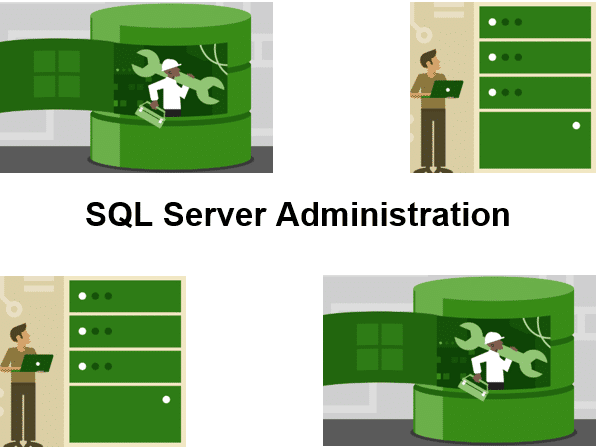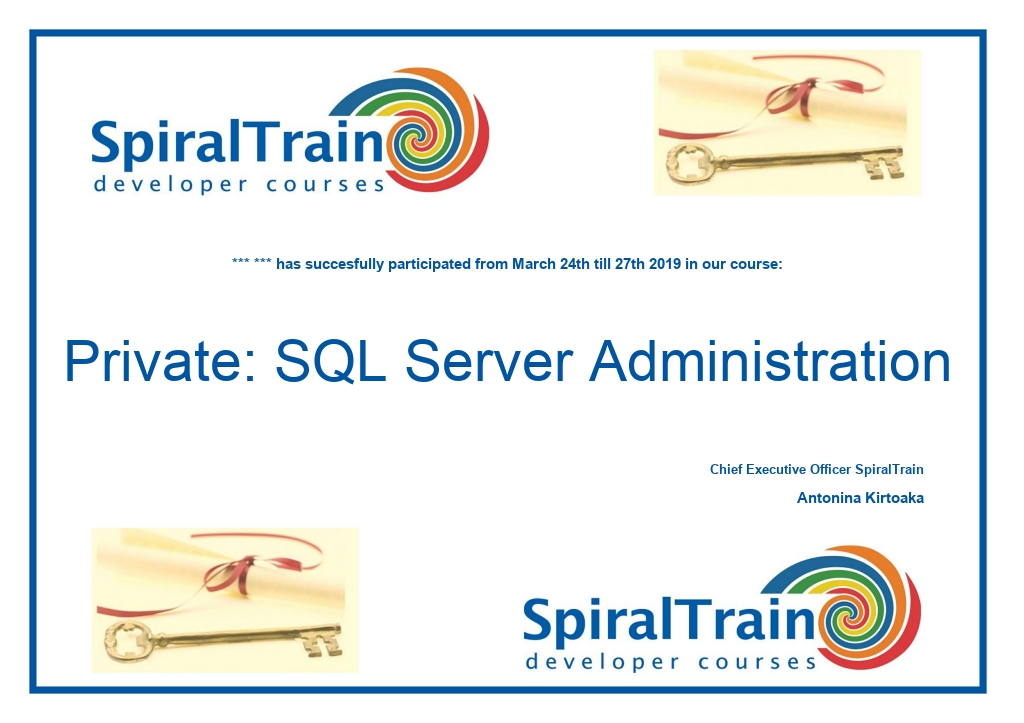-
Learning by doing
-
Trainers with practical experience
-
Classroom training
-
Detailed course material
-
Clear content description
-
Tailormade content possible
-
Training that proceeds
-
Small groups
The course SQL Server Administration from SpiralTrain is designed for individuals who want to learn how to effectively manage and maintain a Microsoft SQL Server database. The course covers a range of topics including server and database configuration, indexes, database consistency, security, backup and restore, high availability and performance.
The course SQL Server Administration starts with an overview of SQL Server and its various components, such as the database engine, SQL Server Management Studio, and Transact-SQL.
Next attention is paid to configuring the SQL Server instance. The various settings including memory, network protocols and collation are discussed in this respect.
Also the creation and configuration of databases, including filegroups, file sizes, and file placement is on the schedule of the course SQL Server Administration. Table partitioning and table compression are covered as well.
Another subject in the course content is which different types of indexes are available in SQL Server and how to create and maintain them for optimal performance.
Furthermore the importance of maintaining database consistency is discussed. Different techniques for ensuring the integrity of data in SQL Server like checking and fixing errors, checking consistency and emergency mode are covered.
An important subject covered in the course SQL Server Administration are the various security features available in SQL Server, including authentication, authorization, and encryption.
Also how to create and manage backups of an SQL Server databases, as well as how to restore them in case of disaster is a topic.
Finally we cover what views are and how they can be used for abstraction, security, and query reuse. It is also discussed how to use triggers for auditing, data validation, and maintaining denormalized data.
The course SQL Server Administration is intended for database administrators who need to manage, monitor and support Microsoft SQL Server databases and Microsoft SQL Server servers.
Prior knowledge of the SQL query language and databases is required for participation in the course SQL Server Administration.
The course material is covered on the basis of presentations. Demos clarify the theory and practical exercises ensure that the material well understood.
After successful completion of the course participants receive a certificate SQL Server Administration.

Module 1 : SQL Server Intro |
Module 2 : Server Configuration |
Module 3 : Database Configuration |
|
SQL Server Editions Storage Requirements OS Considerations Database Engine Service Analysis Server Data Quality Client Connectivity Tools Integration Services GUI Installation Standalone Instance Instance Configuration Feature Selection |
Instance Configuration Using sp_configure Processor Configuration Memory Configuration Trace Flags Ports and Firewalls System Databases mssqlsystemresource MSDB Master and Model Buffer Pool Hybrid Buffer Pool |
Data Storage Filegroups Filegroup Maintenance Memory-Optimized Filegroups Scoped Configurations Recovery Model Log Fragmentation Table Partitioning Partition Elimination Table Compression Durability Compiled Objects |
Module 4 : Indexes |
Module 5 : Database Consistency |
Module 6 : SQL Server Security |
|
Clustered Indexes Primary Key Clustering Nonclustered Indexes Covering Indexes Filtered Indexes In-Memory Indexes Maintaining Indexes Index Fragmentation Filtered Statistics Incremental Statistics Managing Statistics |
Consistency Errors Page Verify Option Suspect Pages Master DB Corruption Corruption of Binaries DBCC CHECKDB Checking for Errors Fixing Errors Emergency Mode DBCC Commands Consistency Checks |
Security Hierarchy Server Roles Logins Granting Permissions Database Level Security Schemas Object Level Security Server Audits Security Reports SQL Data Discovery Vulnerability Assessment |
Module 7 : Backup and Restore |
Module 8 : Views and Triggers |
|
|
Backup Fundamentals Recovery Models Backup Types Partial Backup Transaction Log Backup Backup Strategies Restoring a Database Restoring via T-SQL Using Management Studio Restoring Files Restoring Pages Parameter Sniffing |
View Concepts Create/Alter Views Indexed views Schemabinding Stored Procedures Parameters and Outputs Transactions Temp Tables Auditing Triggers Validation Triggers Reading Execution Plans Seeks, Scans, Joins |
